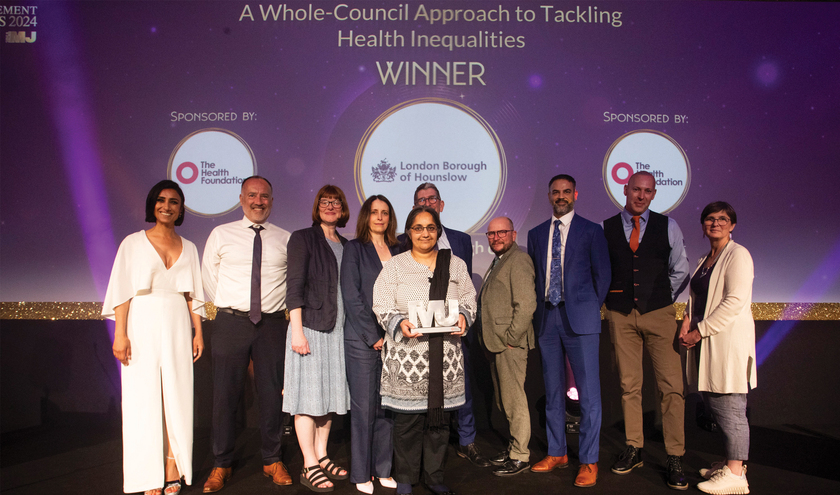It is always a delight to take a step back and celebrate the inspiring work of councils and this is why The MJ Awards has been a highlight of our work on improving health and reducing health inequalities.
By sponsoring the Whole-Team Approach to Tackling Health Inequalities Award, the Health Foundation is shining a spotlight on the excellent work that continues in councils, despite very challenging financial circumstances.
National government must play its role too. The incoming Government is making positive steps to improve health and reduce inequalities. But more thinking is needed to embed accountability and independence into their work on missions
Councils and the people who work for them have the potential to make positive changes to many of the building blocks needed for good health: things like housing, access to green space and education. Our award celebrates the councils who are making progress in these areas.
We received more than 20 nominations and were bowled over by the scale and breadth of the work. The passion, drive and commitment they all showed made it a challenge to select a winner, but in the end the ambitious and innovative approach from Hounslow LBC shone through.
Their joint working, co-production, targeted community engagement and place-based analysis led to transformed services that improved residents' health and opportunities to thrive.
But it is not all due to councils: we need action to be taken by all those whose decisions and policies impact citizens. This is why, alongside our work with councils and their local systems, the Health Foundation is investing in combined authorities to support action to reduce inequalities. We are also supporting research to identify the learning about health inequalities from regional devolution.
National government must play its role too. The incoming Government is making positive steps to improve health and reduce inequalities. But more thinking is needed to embed accountability and independence into their work on missions.
And for local government, action is also needed to make local government funding sufficient, sustainable, and proportionate to need.
Health Foundation-funded research by the Institute for Fiscal Studies has shown the use of old data fuels significant variation in the amount of funding local authorities receive for services, resulting in some areas with high assessed need receiving less than their fair share.
In the future, there needs to be marked improvement in funding allocation, transparency and support for local areas to address specific needs. Without this, we will not see reductions in the inequalities the Government hopes to deliver.
Katherine Merrifield and Gwen Nightingale are assistant director (job-share) Healthy Lives, at The Health Foundation
The MJ Awards 2025 are now open to applications. You can find out how to enter at www.mjawards.co.uk
Tackling health inequalities in Hounslow via community interventions
Hounslow, a diverse outer London borough with a population of 288,000, faces numerous health barriers due to inadequate healthcare access, socio-economic factors, environmental issues, and individual behaviours.
These barriers result in high rates of diabetes, hypertension, adult and child obesity, infant mortality, dental decay, suicide, dementia, loneliness, and substance misuse.
The necessity of technology access has increased with new care models and remote working. However, digital exclusion (lack of access to digital devices, internet connectivity, and necessary skills) significantly impacts marginalised groups like the elderly, disabled, migrants, and low-income families. This exclusion leads to poorer health outcomes, delayed diagnoses, reduced preventive care access, and poorer chronic condition management.
To address these issues, the Digital Inclusion for Social and Health Impact (DISH) partnership was formed by Hounslow LBC and Chelsea and Westminster NHS Foundation Trust, supported by the Health Foundation. The project focused on community engagement, relationships and partnerships, and data and digital themes. Key community engagement initiatives included:
- Leveraging council community groups: Seventy residents from seven under-represented groups participated. Localised learning materials were developed to create tailored resources reflecting cultural needs and barriers to digital healthcare uptake.
- Recruitment of Digital Champion volunteers: Volunteers from community groups provided personalised assistance, helping individuals navigate digital platforms, online health information, and telehealth services. These volunteers now support more than 800 residents annually with IT support and NHS-approved apps for repeat prescriptions, appointments, and advice.
- Place-based interventions: Addressing transport barriers by informing of the locations of mobile health units and establishing four new community hubs in areas with poor transport links to improve service access.
- Council device recycling expansion: Partnering with Chelsea and Westminster NHS Foundation Trust to sustainably source an additional 1,000 local devices annually, maximising economic benefits within the local economy.
- Growing community networks: Successfully engaging with more underserved groups to expand the community networks.
The ambition is to expand this work, developing co-production and joint efforts with all communities and system partners to reduce health inequalities. This will primarily take the form of developing a Population Health Management database to enable localised health insights to be generated, expanding community group consultation to gather views prior to project rollouts and closer alignment of partner organisation processes and products. Providing access to technology and digital skills can empower individuals and communities to take action on their health and contribute to taking action on the wider determinants of health.
A Whole-Council Approach to Tackling Health Inequalities
Winner: Hounslow LBC
Sponsored by The Health Foundation


